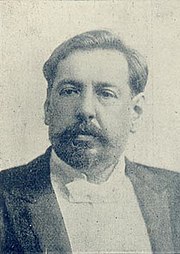José Batlle y Ordóñez
José Pablo Torcuato Batlle y Ordóñez (born May 21, 1856 in Montevideo , † October 20, 1929 ibid) was a Uruguayan journalist and politician. He was President of Uruguay from 1903 to 1907 and from 1911 to 1915.
Life
José Batlle y Ordóñez came from a politically active family. He was the son of the former President Lorenzo Batlle y Grau , a general and president from 1868 to 1872. He was also the uncle of another Uruguayan president, Luis Batlle Berres and great-uncle of the 2000-2005 incumbent President Jorge Batlle .
He first worked for the newspaper La Nación and was one of the editors of La Razón at the age of 25 . Before he studied law at the Universidad de la República from 1882 , Batlle made a trip to Europe. In 1886 he appeared as the founder of the newspaper El Día .
Batlle, a member of the liberal and increasingly left-wing Colorado Party under his leadership , was first elected member of the Cámara de Representantes in 1891 as a representative of the Salto Department . In 1897 he was elected again in Minas . The following year he was a member of the State Council and held a senatorial mandate for Montevideo . In 1899 he became President of the Senate and held the post of President of Uruguay from February 15, 1899 to March 1, 1899 for the first time in his political career. He was then president of the country two more times. His terms of office lasted from March 1, 1903 to March 1, 1907 and from March 1, 1911 to March 1, 1915. Between these two terms of office he undertook another trip to Europe. During this time Claudio Willimann took over the office of President. Party-internal deviants from Battles left turn called themselves Reveristas .
Batlle was a representative of an interventionist economic policy and is considered the founder of the social welfare state in Uruguay. During his second term as president, Batlle started a new movement he called Batllismo . He protected the state against foreign economic imperialism . In 1911, for example, he supported the emerging domestic industrial start- ups by creating import tariffs . The country's social legislation has also undergone reforms. During this time he fought for the introduction of unemployment benefits (1914) and universal voting rights . The eight-hour working day with a maximum of 48 hours a week was established (1915) and a compulsory rest day was introduced after five working days. Employees were insured against accidents at work by introducing liability insurance that burdens their employers, and a modern pension system with an old-age pension from the age of 60 was installed.
The political changes brought a lot of government participation in what had been an almost free economy. The country's largest banks, railways, roads, post offices and telecommunications, as well as electricity companies, were nationalized. In 1911 the State Insurance Bank was founded. The port of Montevideo was placed under state administration. The government took over the importation of foreign products including machinery and raw materials. The growth of the meat processing industry stimulated livestock, Uruguay's main source of wealth and foreign exchange income.
Education and training in the country were another concern of his. Batlle introduced the free and compulsory primary school and the now free access to universities, as well as the admission of women to all departments of the universities, i.e. a comprehensive and free school and education system. A maternity leave was introduced and the right to strike recognized. During his tenure the separation of church and state was carried out. In 1906, for example, crucifixes were banned from hospitals and references to God and the Gospel were removed from public oaths. A first divorce law was also introduced, which also made divorce possible at the request of the woman. The abolition of the death penalty also fell during his term of office.
In 1913 Batlle proposed a reorganization of the government that would replace the presidency with a nine-member multi-party college similar to the Swiss Federal Council (principle of collegiality ). His social programs were financed by a moderate skimming off of agricultural export profits, without incurring the large landowners against his policy, since he always granted them personal participation in the government.
Honors
The town of Nico Pérez, founded in 1883, was renamed on March 19, 1907 in his honor to the name of José Batlle y Ordóñez .
literature
- Milton I. Vanger: The Model Country: José Batlle y Ordóñez of Uruguay, 1907-1915. , Publisher: University Press of New England, n.d. 1980, ISBN 0-87451-184-4
- Peter Fellenberg in Biographies on World History , VEB Deutscher Verlag der Wissenschaften, Berlin 1989, p. 69
Web links
Individual evidence
- ↑ a b c d e f g Leslie Manigat : L'Amérique latine au XXe siècle - 1889–1929 . H146. Éditions du Seuil , Paris 1991, ISBN 978-2-02-012373-0 , pp. 189 ff . (première édition aux Éditions Richelieu 1973).
- ↑ Data on rulers.org
- ^ "Sport and Society in Uruguay", p.8 by Bernd Schulze
| predecessor | Office | successor |
|---|---|---|
| Juan Lindolfo Cuestas |
President of Uruguay February 15, 1899–1. March 1899 |
Juan Lindolfo Cuestas |
| predecessor | Office | successor |
|---|---|---|
| Juan Lindolfo Cuestas |
President of Uruguay March 1, 1903–1. March 1907 |
Claudio Williman |
| predecessor | Office | successor |
|---|---|---|
| Claudio Williman |
President of Uruguay March 1, 1911–1. March 1915 |
Feliciano Viera |
| personal data | |
|---|---|
| SURNAME | Batlle y Ordóñez, José |
| ALTERNATIVE NAMES | Batlle y Ordóñez, José Pablo Torcuato (full name) |
| BRIEF DESCRIPTION | Uruguayan journalist and politician |
| DATE OF BIRTH | May 21, 1856 |
| PLACE OF BIRTH | Montevideo , Uruguay |
| DATE OF DEATH | October 20, 1929 |
| Place of death | Montevideo , Uruguay |
